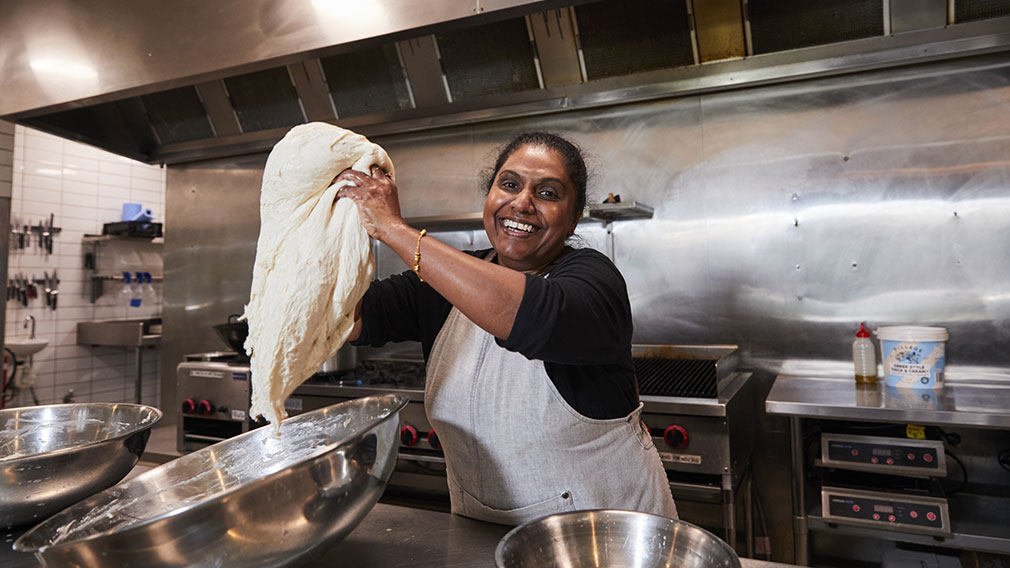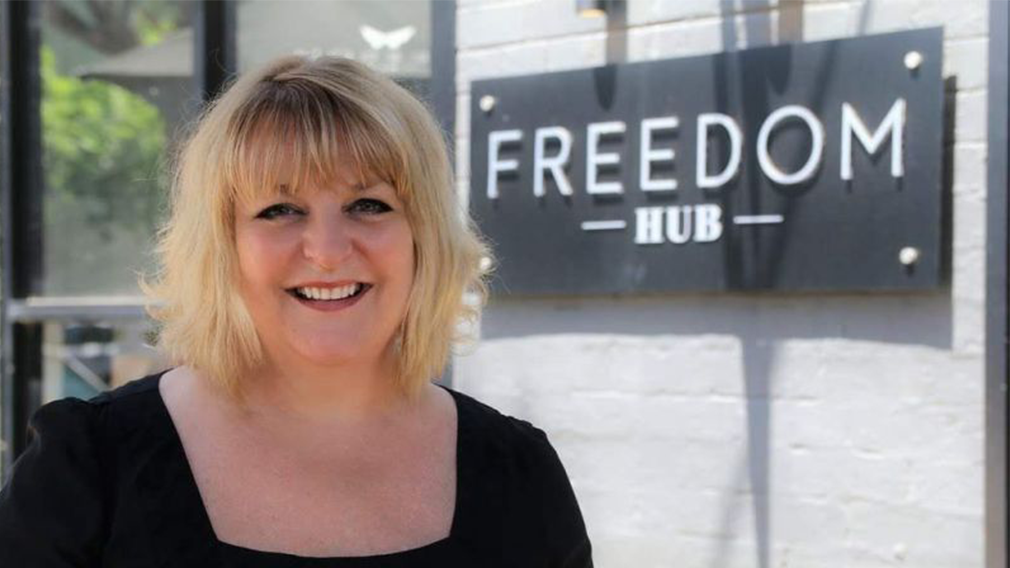Nundah wonder: the small enterprise blazing a big trail
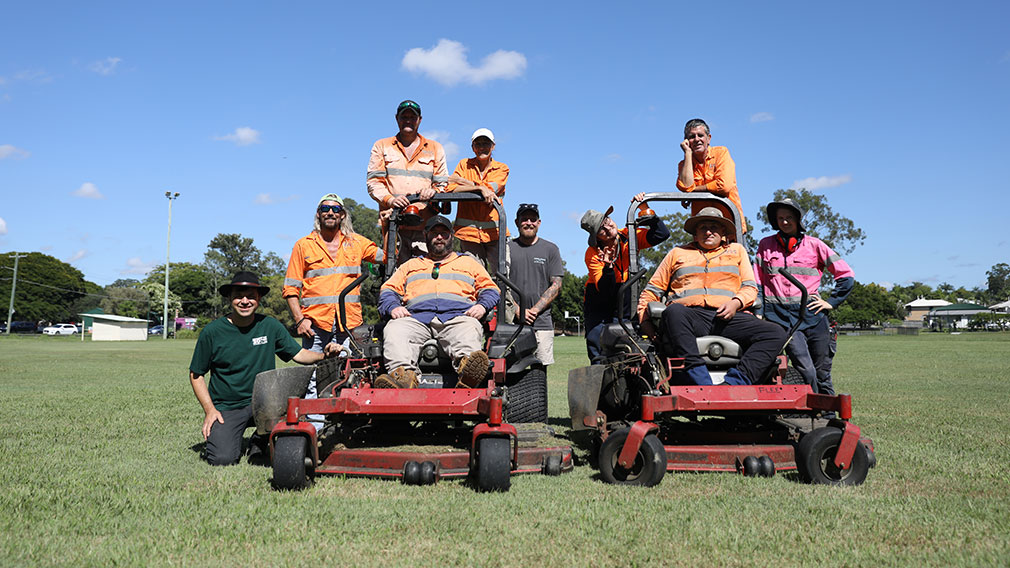
Richard Warner (left) with some of Nundah Co-op’s “park crew” at Boyd Park, Nundah. (Emma Foster)
In a suburban café opposite Nundah train station in Brisbane’s north, Richard Warner dips in and out of our conversation as an eclectic mix of staff and passers-by edge over to greet him.
As commonplace as Espresso Train Café appears, I soon learn the place and these people are part of an enterprise that’s broken a remarkable amount of new ground.
Warner is the chief executive of the Nundah Community Enterprise Co-operative which opened the café 20 years ago as part of its trailblazing business model, formed five years earlier, with a simple mission: to generate jobs for people who were keen to work but struggled to find it because of the discrimination they often faced as people living with cognitive difficulties.
As the co-op enters its twenty fifth year, I caught up with Warner to hear how the business – one of Australia’s oldest social enterprises – became an early pioneer in a sector which has since grown to an estimated 12,000 businesses contributing $21 billion annually to the national economy.
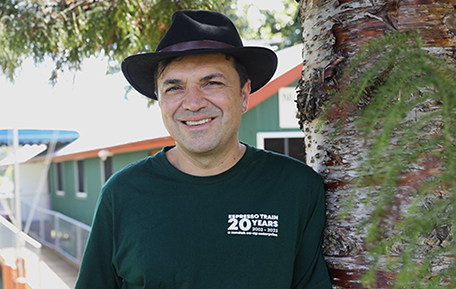
Richard Warner, Nundah Community Enterprise Co-operative’s chief executive.
“At the time we were set up, no one had really started calling themselves a ‘social enterprise’,” says Warner, a qualified social worker, who had worked alongside Nundah Co-op since its early days before joining to lead the business in 2011.
“We were certainly one of the first to use ‘social tendering’ as we called it then, and to be conscious of existing primarily to have a social impact while being funded by a business engine.”
The co-op was formed in 1998 by a handful of people – including five young people with cognitive difficulties. They met with a small community organisation, the Community Living Association. Together, they agreed to pool resources to see if a mutual approach to employment generation, a ‘workers’ cooperative’, might work.
It started as a jobs club, where employee members were supported by a social work student and two local resident volunteers to do a few one-off paid gigs, like washing cars and gardening.
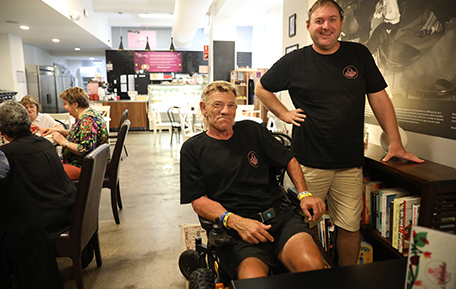
Michael (right) and Danny (left), founding members of Nundah Co-op, at Marhaba Café.
Michael was among the founding employees, 19 years old at the time. He tells me about the team’s first ever mowing job.
“My boss at the time, Andy, was really nice and taught me how to do the knots to tie everything down properly in the back of the Hilux,” he recalls.
“It was hard work with the push mower – we didn’t have the big ride-ons that we have today – but we got through it.”
Before the co-op formed, Michael’s first job, pushing trolleys at a supermarket had not been a good experience.
“The people there said, ‘Just do the job, or go’. They wouldn't help you when you needed it. I just didn't enjoy it, full stop,” he says.
“I needed a job where I could be around people that supported me. It was hard, but there were others like that, so we all got together and that’s how Nundah Co-op started. I’m still here because, here, you can see customers come in, make cakes for them and see them enjoy the food and be happy. You can get the job done, go home and say, ‘I've done a good day's work’.”
Another founding member, Danny, had a string of previous short-term jobs, including on the factory floor of a skylight maker and as a dishwasher. While he built up skills, he says he faced many incidents he now recognises as discrimination.
"But at Nundah, I found the supervisors were easier to get on with and were better at showing you, if you are doing something wrong, they’ll show you and help you to do it," says the 54-year-old.
Breakthrough Contract
Warner explains the breakthrough for Nundah Co-op came in 2001 with another pioneering move: persuading Brisbane City Council to hire their team to maintain three local public parks.
“Securing that first contract was critical to the viability of our business model, because that steady income formed the basis on which we've been able to build,” he says.
“They certainly had to work through a lot of challenges – around how one of the largest councils in Australia could tender work with a small grass roots organisation like ours.”
That deal was one of the earliest examples of what’s now commonly known as ‘social procurement’, a mechanism by which many social enterprises across Australia provide goods and services to governments and corporates, which in turn secures jobs for people facing high barriers to work.
It was also a trigger for Brisbane City Council to formally incorporate social enterprises as part of its procurement activities, says Adam Allan, councillor of the Northgate Ward in which Nundah’s located.
“It was Nundah Co-op that kicked it off, and over time, that relationship’s grown bit by bit, and we've also formed relationships with a range of other organisations with different contracts,” Allan tells me.
Last year, the council spent more than $13 million with almost 40 social enterprises for a range of services, Allan says, from cleaning the city’s buses to building the enclosures over its bins, and he expects those numbers to rise.
“We're constantly looking for services that can be provided to council by the social enterprise ecosystem so it continues to grow,” he says, noting that many social enterprises are now competing head-to-head with for-profit style businesses, and winning.
“So, it was a little stone in the pond that's created quite big ripples,” Warner reflects.
It’s estimated there are now more than 2,000 social enterprises in Queensland contributing $3.8 billion in economic value, according to research commissioned by Social Enterprise Australia.
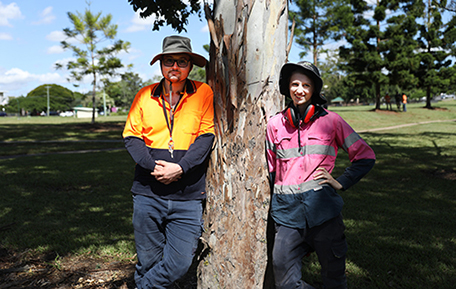
Two of the park crew, Blake and Leisel.
A fixture in Nundah's community
Since its initial three park contract, Nundah Co-op’s crew now maintains around 40 local parks in the area, as well as the streetscape of Nundah Village and the Brisbane Supreme Court gardens. It’s also led to separate contracts with others such as Transport and Main Roads Queensland and Mirvac.
When we finish our coffee, Warner takes me to meet the maintenance crew at Boyd Park, just a few blocks from the café.
Two of the 12-person crew, Liam and Jack manoeuvre their ride-on mowers off their trailers towards the oval, ready to tame the expanse of grass. Their skill with the large machines is obvious.
“The park maintenance contracts have been critical, because often for our workers we need a certain type of work, that's entry level and reasonably repeatable, and also contributes something that’s valuable to the community,” Warner says.
“I love seeing the pride our people take in their work, and how they have overcome some of the challenges of discrimination they've experienced, of not feeling accepted, and how very proud they are to now be in a role where they're successful.”
From grass cutting to coffee grinding
As the co-op grew in its early years, attracting new members with different interests and abilities, the enterprise added its hospitality arm, starting with some catering and delivery jobs. Espresso Train Café was born when space became available in a former pizza shop in 2003.
Last year, the team opened a second venue, Marhaba Café, under Brisbane’s City Hall in the CBD, previously occupied by the Red Cross. It also has other catering contracts, including for some sports field canteens and community halls.
Today the co-op has a staff of more than 50, 35 of whom have cognitive difficulties, each person matched to quality jobs in a way that meets the needs of the employee and the business.
Warner sees potential for further growth and, because of the place-based nature of the business, is looking to ‘horizontal scaling’, whereby the co-op seeds and supports other social enterprises across Queensland based on the same business model.
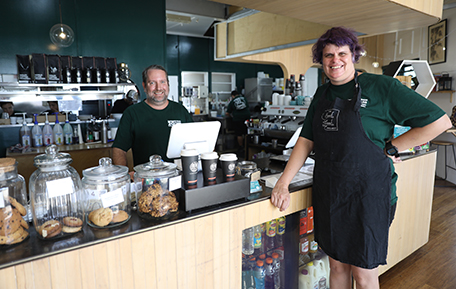
Carolyn (right), who joined Nundah Co-op three years ago, with cafe manager Sam (behind counter) at Espresso Train Café.
Carolyn, one of the co-op’s newer members, meets us back at the Espresso Train Café where we’ve retreated from the heat of the park visit under the Queensland sun.
She joined the co-op’s cafe three years ago after her previous job of 20 years came to an end. She’d been working in the distribution centre of a large printing and mail house packing envelopes.
“It's much more friendly here than where I used to work,” says the 46-year-old, who’s rapport with customers clear as she jokes with each one as they pass by.
But the thing Carolyn’s most eager to talk about is the annual musical show put on each September by staff, called the Nundah All Stars.
“I’m doing a song by Helen Reddy,” she says, confirming to me that rehearsals for her rendition of the Australian singer’s famous feminist anthem ‘I am Woman’ are already well underway.
Westpac Foundation has been one of Nundah Community Enterprise Co-operative's longest-running funding partners, granting the organisation more than $500,000 since 2009.


